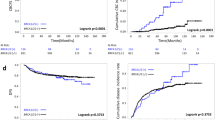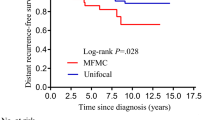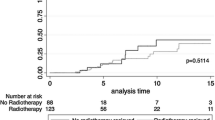Abstract
Pathological features and consequently, tumor response differ between BRCA1/2 carriers and sporadic breast cancer (BC) cases. It is expected that BRCA1/2 associated tumors will be more vulnerable to DNA damaging agents and irradiation due to their function in DNA repair. In addition, very high pathological complete response (pCR) rate of approximately 40–50% to neo-adjuvant chemotherapy were reported by two studies. We describe the clinical outcome, i.e.; complete response (cCR), major pathological response (more than 80% reduction in tumor mass), pathologiacl CR (pCR) and local control rates in 15 BRCA1 and 7 BRCA2 carriers, all diagnosed at stage III and treated with anthracyclin based chemotherapy, mastectomy, and irradiation. cCR were found in 6/15 carriers and in 1/7 BRCA2 carriers (P = 0.3). Rate of major pathological response were 4/15 (26.6%) in BRCA1 compared with none of BRCA2 carriers (P = 0.3). Of them, pCR was recorded in 2/15 of BRCA1 carriers. Clinical and pathological nodal involvements were lower in BRCA1 carriers. While all BRCA2 carriers remained node positive as compared to 50% of BRCA1 carriers (P = 0.047), overall survival was similar in both groups. However, approximately 1/3 of BRCA1 carriers did not respond to chemotherapy and 4/15 died within 5 years of diagnosis. We found a non-significant higher clinical and pathological response rate among BRCA1 carriers in response to neo-adjuvant chemotherapy compared with BRCA2 carriers. Our results suggest chemoresistance of approximately a 1/3 of BRCA1 associated tumors. Tumors of BRCA2 carriers are resistant to chemotherapy, while the estrogen receptor positive nature of tumors results in better post recurrence survival.

Similar content being viewed by others
References
Marcus JN, Watson P, Page DL et al (1996) Hereditary breast cancer: pathology, prognosis and BRCA1 and BRCA2 gene linkage. Cancer 77:697–709. doi:10.1002/(SICI)1097-0142(19960215)77:4<697::AID-CNCR16>3.0.CO;2-W
Hamann U, Sinn HP (2000) Survival and tumor characteristics of German hereditary breast cancer patients. Breast Cancer Res Treat 59:185–192. doi:10.1023/A:1006350518190
Rennert G, Bisland-Naggan S, Barnett-Griness O et al (2007) Clinical outcome of breast cancer in carriers of BRCA1 and BRCA2 mutations. N Engl J Med 357:115–123. doi:10.1056/NEJMoa070608
Foulkes WD, Wong N, Brunet JS et al (1997) Germline mutation is an adverse prognostic factor in Ashkenazi Jewish women with breast cancer. Clin Cancer Res 3:2465–2469
Stoppa-Lyonnet D, Ansquer Y, Dreyfus H et al (2000) Familial invasive breast cancers: worse outcome related to BRCA1 mutations. J Clin Oncol 18:4035–4039
Robson ME, Chappuis PO, Satagopan J et al (2004) A combined analysis of outcome following breast cancer: differences in survival based on BRCA1/BRCA2 mutation status and administration of adjuvant treatment. Breast Cancer Res 6:R8–R17. doi:10.1186/bcr658
Boyd D, Somoda Y, Federici MG et al (2000) Clinicopathologic features of BRCA linked and sporadic ovarian cancer. J Am Med Assoc 283:2260–2265. doi:10.1001/jama.283.17.2260
McGuire V, Whitmore AS, Norris R, Oakley-Girvan I (2000) Survival in epithelial ovarian cancer patients with prior breast cancer. Am J Epidemiol 152:528–532. doi:10.1093/aje/152.6.528
Ben David Y, Chetrit A, Hirsh-Yechezkel G et al (2003) Effect of BRCA mutations on the length of survival in epithelial ovarian tumors. J Clin Oncol 20:463–466. doi:10.1200/JCO.20.2.463
Foulkes DF (2006) BRCA1 and BRCA2: chemosensitivity, treatment outcomes and prognosis. Fam Cancer 5:135–142. doi:10.1007/s10689-005-2832-5
Lakhani SR, Jacquemier J, Sloane JP et al (1998) Multifactortial analysis of differences between sporadic breast cancers and cancers involving BRCA1 and BRCA2 mutations. J Natl Cancer Inst 90:1138–1145. doi:10.1093/jnci/90.15.1138
Levine DA, Federici MG, Reuter VE, Boyd J (2002) Cell proliferation and apoptosis in BRCA-associated hereditary ovarian cancer. Gynecol Oncol 85:431–434. doi:10.1006/gyno.2002.6646
Foulkes WD, Metcalfe K, Hanna W et al (2003) Disruption of the expected positive correlation between breast tumor size and lymph node status in BRCA1-related breast carcinoma. Cancer 98(8):1569–1577. doi:10.1002/cncr.11688
Chappuis DO, Goffin J, Wong N, Perret C (2002) A significant response to neoadjuvant chemotherapy in BRCA1/2 related breast cancer. J Med Genet 39:608–610. doi:10.1136/jmg.39.8.608
Delaloge S, Pelissier P, Kloos I et al (2002) BRCA1 linked breast cancer is highly more chemosensitive than its BRCA2-linked or sporadic counterparts. 27th ESMO, Niece, France, Abstract no. 120
Rouzier R, Perou CM, Symmans WF et al (2005) Breat cancer molecular subtypes respond differently to preoperative chemotherapy. Clin Cancer Res 11(16):5678–5685. doi:10.1158/1078-0432.CCR-04-2421
Carey LA, Dees EC, Sawyer L et al (2007) The triple negative paradox: primary tumor chemosensitivity of breast cancer subtypes. Clin Cancer Res 13(8):2329–2334. doi:10.1158/1078-0432.CCR-06-1109
Liedtke C, Mazouni C, Hess KR et al (2008) Response to neoadjuvant chemotherapy and long-term survival in patients with triple-negative breast cancer. J Clin Oncol 26(8):1275–1281. doi:10.1200/JCO.2007.14.4147
Bremer M, Steinmann D, Dork T, Borger J, Rades D, Karstens JH (2001) Bilateral breast carcinoma and local recurrence: prevalence of BRCA-1 and BRCA-2 gene mutations in an unselected patient sample. Strahlenther Onkol 177:325–329. German. doi:10.1007/PL00002414
MacLachlan TK, Takimor R, El-Deiry WS (2002) BRCA1 directs a selective p53-dependent transcriptional response towards growth arrest and DNA repair targets. Mol Cell Biol 22:4280–4292. doi:10.1128/MCB.22.12.4280-4292.2002
Fabbro M, Schuechner S, Av WW, Henderson BR (2004) BARD1 regulates BRCA1 apoptosis function by a mechanism involving nuclear retention. Exp Cell Res 298:661–673. doi:10.1016/j.yexcr.2004.05.004
Greenblatt MS, Chappuis PO, Bond JP et al (2001) TP53 mutations in breast cancer associated with BRCA1 or BRCA2 germline mutations: distinctive spectrum and structural distributions. Cancer Res 61:4092–4097
Buller RE, Lallas TA, Shahin MS et al (2001) The P53 mutation spectrum associated with BRCA1 mutation ovarian cancer. Clin Cancer Res 7:831–838
Saal L, Grunberger-Saal SK, Persson C et al (2008) Recurrent gross mutations of the PTEN tumor suppressor gene in breast cancers deficient DSB repair. Nat Genet 40(1):102–107. doi:10.1038/ng.2007.39
Author information
Authors and Affiliations
Corresponding author
Rights and permissions
About this article
Cite this article
Hubert, A., Mali, B., Hamburger, T. et al. Response to neo-adjuvant chemotherapy in BRCA1 and BRCA2 related stage III breast cancer. Familial Cancer 8, 173–177 (2009). https://doi.org/10.1007/s10689-008-9223-7
Received:
Accepted:
Published:
Issue Date:
DOI: https://doi.org/10.1007/s10689-008-9223-7




